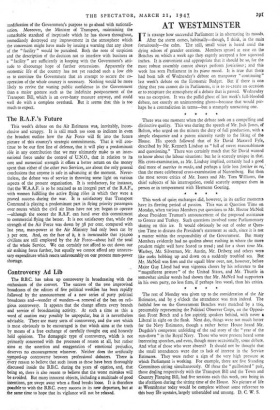AT WESTMINSTER
IT is strange how successful Parliament is in alternating its moods. After the storm comes, habitually—though, I think, in the main fortuitously—the calm. The still, small voice is heard amid the dying echoes of grander orations. Members sprawl at ease on the Benches on which a week ago they eagerly accepted a few squeezed inches. It is convenient and appropriate that it should be so, for the most robust assembly cannot always perform fortissimo ; and this week has seen Parliament in its piano mood. It is true that there had been talk of Wednesday's debate on manpower " continuing " last week's debate on the Economic Budget. But if there is one thing that you cannot do in Parliament, it is to re-create an occasion or to recapture the atmosphere of a debate that is passed. Wednesday was no exception. It was the pallid ghost of last week's full-blooded debate, not exactly an uninteresting ghost—because that would per- haps be a contradiction in terms—but a strangely unexciting one.
* * * There was one moment when the debate took on a compelling and distinctive quality. This was during the speech of Mr. Jack Jones, of Bolton, who urged on the miners the duty of full production, with a simple eloquence and a patent sincerity vastly to the liking of the House. His speech followed that of Sir David Maxwell Fyfe, described by Mr. Kenneth Lindsay as " full of sweet reasonableness and questioning." There was certainly much that Sir David wanted to know about the labour situation: but he is scarcely unique in that. His cross-examination, as Mr. Lindsay implied, certainly had a good deal more of suaviter in modo, and perhaps a little less Ionizer in re, ' than the more celebrated cross-examination of Nuremberg. But then the most severe critics of Mr. Isaacs and Mr. Tom Williams, the chief subjects of his interrogation, could scarcely compare them in person or in temperament with Hermann Goering.
* * * *
This week of quiet exchanges did, however, in its earlier moments have its fleeting period of passion. This was at Question Time on Monday, when various Members put questions to Mr. Hector McNeil about President Truman's announcement of the proposed assistance to Greece and Turkey. Such questions involved some Parliamentary skating on thin ice. It would obviously be out of order at Ques- tion Time to discuss the President's statement as such, since it is not a matter within the responsibility of the Government. But many Members evidently had no qualms about rushing in where the more prudent might well have feared to tread ; and for a short time Mr. Warbey, Mr. Silverman, Mr. Austin, Mr. Driberg and others were like corks bobbing up and down on a suddenly troubled sea. But Mr. McNeil was firm and the squall blew over, not, however, before Major Guy Lloyd had won vigorous cheers by his reference to the "magnificent gesture" of the United States, and Mr. Thurtle in somewhat similar words had shown that Mr. McNeil had supporters in his own party, no less firm, if perhaps less vocal, than his critics.
* * * The rest of Monday was given up to the consideration of the Air Estimates, and by 5 o'clock the attendance was thin indeed. The faithful few on the Government Benches were matched by a trio, presumably representing the Political Observer Corps, on the Opposi- tion Front Bench and a few aspiring speakers behind, with never a Liberal in sight on the flank. Next day, things were not much better for the Navy Estimates, though a rather better House heard Mr. Dugdale's competent unfolding of the sad story of the " year of the run-down " in the Royal Navy. Those who were present heard some interesting speeches, and even, though more occasionally, some debate. And what of those who were absent? It should not be thought that the small attendances were due to lack of interest in the Service Estimates. They were rather a sign of the very high pressure at which Parliament is working. For example, there are five Standing Committees sitting simultaneously. Of these the " guillotined " pair, those de9ing respectively with the Transport Bill and the Town and Country Planning Bill, had five sessions each this week, two being in the afternoon during the sitting time of the House. No picture of life at Westnilnster today would be complete without some reference to this busy life upstairs, largely unheralded and unsung. D. C. W. S.


































 Previous page
Previous page